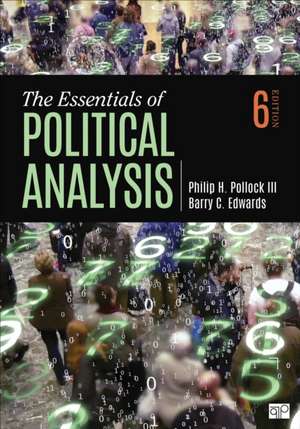The Essentials of Political Analysis
Autor Philip H. Pollock, Barry Clayton Edwardsen Limba Engleză Paperback – 6 noi 2019
Preț: 727.26 lei
Preț vechi: 982.78 lei
-26% Nou
139.18€ • 144.77$ • 114.90£
Carte disponibilă
Livrare economică 24 martie-07 aprilie
Livrare express 07-13 martie pentru 35.26 lei
Specificații
ISBN-10: 1506379613
Pagini: 368
Dimensiuni: 178 x 254 x 20 mm
Greutate: 0.66 kg
Ediția:Sixth Edition
Editura: SAGE Publications
Colecția CQ Press
Locul publicării:Washington DC, United States
Recenzii
“Pollock and Edwards explain the nuts-and-bolts of research design and data analysis in a clear and concise style. The Essential of Political Analysis is an intuitive introduction to complex material, replete with examples from the political science literature that add relevance to statistical concepts. This text offers students an excellent balance between the technical and the practical.”
“The recent edition of The Essentials of Political Analysis provides a strong foundation in statistics for political science students. The integration between the main textbook and its companion is excellent. The instructor resources present effective teaching tools that complement the book seamlessly.”
Cuprins
Tables, Figures, and Boxes
Preface
Acknowledgments
About the Authors
Introduction
Facts and Values in Perspective
The Scientific Approach
What This Book Is About
Conclusion
Key Terms
Notes
CHAPTER 1 • The Definition and Measurement of Concepts
Learning Objectives
Conceptual Definitions
Operational Definitions
Measurement Error
Reliability and Validity
Working with Datasets, Codebooks, and Software
Summary
Key Terms
Exercises
Notes
CHAPTER 2 • Measuring and Describing Variables
Learning Objectives
Essential Features
Levels of Measurement
Describing Variables
Transforming Variables
Summary
Key Terms
Exercises
Notes
CHAPTER 3 • Proposing Explanations, Framing Hypotheses, and Making Comparisons
Learning Objectives
“All Models Are Wrong, But Some Are Useful”
Proposing Explanations
Framing Hypotheses
Common Mistakes in Hypothesis Writing
Making Comparisons
Graphing Relationships and Describing Patterns
Summary
Key Terms
Exercises
Notes
CHAPTER 4 • Research Design, Research Ethics, and Evidence of Causation
Learning Objectives
Establishing Causation
Experimental Designs
Selecting Cases for Analysis
Conducting Research Ethically
Summary
Key Terms
Exercises
Notes
CHAPTER 5 • Making Controlled Comparisons
Learning Objectives
The Logic of Controlled Comparisons
Essential Terms and Concepts
Effect of Partisanship on Gun Control Vote, Controlling for Gender: An Illustrative Example
Controlled Mean Comparisons
Identifying Patterns
Advanced Methods of Making Controlled Comparisons
Summary
Key Terms
Exercises
Notes
CHAPTER 6 • Foundations of Statistical Inference
Learning Objectives
Population Parameters and Sample Statistics
The Central Limit Theorem and the Normal Distribution
Quantifying Standard Errors
Confidence Intervals
Sample Size and the Margin of Error of a Poll
Inferences with Small Batches: The Student’s t-Distribution
Summary
Key Terms
Exercises
Notes
CHAPTER 7 • Tests of Significance and Measures of Association
Learning Objectives
Statistical Significance and Null Hypothesis Testing
One-Sample Significance Tests
Two-Sample Significance Tests
The Chi-square Test
Measures of Association
Criticisms of Null Hypothesis Testing
Summary
Key Terms
Exercises
Notes
CHAPTER 8 • Correlation and Linear Regression
Learning Objectives
Correlation
Bivariate Regression
Educational Attainment and Voter Turnout in States Example
R-square
Multiple Regression
Some Practical Issues: Multicollinearity, Parsimony, and Missing Data
Analyzing Residuals to Evaluate Linear Regression Models
Summary
Key Terms
Exercises
Notes
CHAPTER 9 • Logistic Regression
Learning Objectives
The Logistic Regression Approach
Logistic Regression Approach to Vote Choice in the 2016 Presidential Election
Finding the Best Fit: Maximum Likelihood Estimation
Logistic Regression with Multiple Independent Variables
Graphing Predicted Probabilities with Multiple Independent Variables
Summary
Key Terms
Exercises
Notes
CHAPTER 10 • Conducting Your Own Political Analysis
Picking a Good Topic
Getting Focused and Staying Motivated
Reviewing Prior Literature
Collecting Data
Writing It Up
Maintain a Scientific Mindset
Key Terms
Exercises
Notes
Index
Descriere
"Pollock and Edwards explain the nuts-and-bolts of research design and data analysis in a clear and concise style. The Essential of Political Analysis is an intuitive introduction to complex material, replete with examples from the political science literature that add relevance to statistical concepts. This text offers students an excellent balance between the technical and the practical." -Francis Neely, San Francisco State University Gain the skills you need to conduct political analysis and critically assess statistical research.
In this Sixth Edition of The Essentials of Political Science, bestselling authors Philip H. Pollock III and Barry C. Edwards build students' analytic abilities and develop their statistical reasoning with new data, fresh exercises, and accessible examples.
This brief, accessible guide walks students through the essentials-measuring concepts, formulating and testing hypotheses, describing variables-while using key terms, chapter-opening objectives, over 80 tables and figures, and practical exercises to get them using and applying their new skills. Using SPSS, STATA or R? Discounted package deals available with Philip H. Pollock's companion workbooks.
. Give your students the SAGE edge! SAGE edge offers a robust online environment featuring an impressive array of free tools and resources for review, study, and further exploration, keeping both instructors and students on the cutting edge of teaching and learning.
